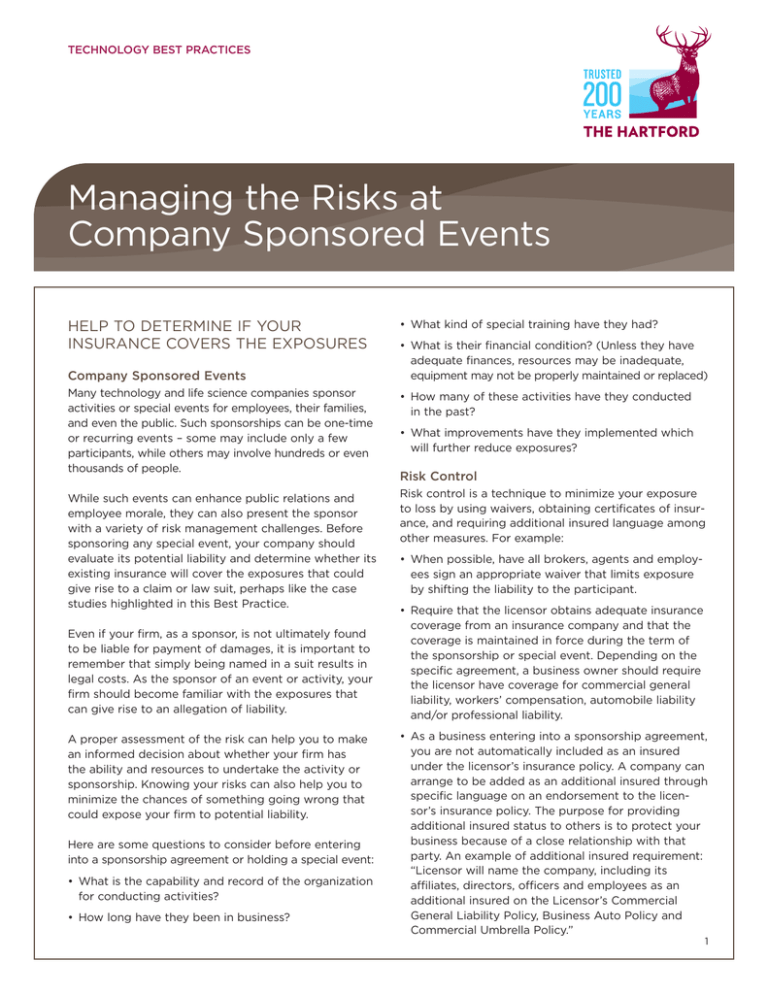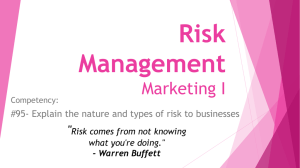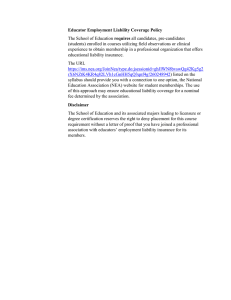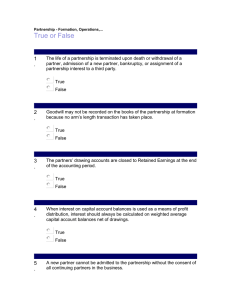
TECHNOLOGY BEST PRACTICES
Managing the Risks at
Company Sponsored Events
HELP TO DETERMINE IF YOUR
INSURANCE COVERS THE EXPOSURES
Company Sponsored Events
• What kind of special training have they had?
• What is their financial condition? (Unless they have
adequate finances, resources may be inadequate,
equipment may not be properly maintained or replaced)
Many technology and life science companies sponsor
activities or special events for employees, their families,
and even the public. Such sponsorships can be one-time
or recurring events – some may include only a few
participants, while others may involve hundreds or even
thousands of people.
• How many of these activities have they conducted
in the past?
While such events can enhance public relations and
employee morale, they can also present the sponsor
with a variety of risk management challenges. Before
sponsoring any special event, your company should
evaluate its potential liability and determine whether its
existing insurance will cover the exposures that could
give rise to a claim or law suit, perhaps like the case
studies highlighted in this Best Practice.
Risk control is a technique to minimize your exposure
to loss by using waivers, obtaining certificates of insurance, and requiring additional insured language among
other measures. For example:
Even if your firm, as a sponsor, is not ultimately found
to be liable for payment of damages, it is important to
remember that simply being named in a suit results in
legal costs. As the sponsor of an event or activity, your
firm should become familiar with the exposures that
can give rise to an allegation of liability.
A proper assessment of the risk can help you to make
an informed decision about whether your firm has
the ability and resources to undertake the activity or
sponsorship. Knowing your risks can also help you to
minimize the chances of something going wrong that
could expose your firm to potential liability.
Here are some questions to consider before entering
into a sponsorship agreement or holding a special event:
• What is the capability and record of the organization
for conducting activities?
• How long have they been in business?
• What improvements have they implemented which
will further reduce exposures?
Risk Control
• When possible, have all brokers, agents and employees sign an appropriate waiver that limits exposure
by shifting the liability to the participant.
• Require that the licensor obtains adequate insurance
coverage from an insurance company and that the
coverage is maintained in force during the term of
the sponsorship or special event. Depending on the
specific agreement, a business owner should require
the licensor have coverage for commercial general
liability, workers’ compensation, automobile liability
and/or professional liability.
• As a business entering into a sponsorship agreement,
you are not automatically included as an insured
under the licensor’s insurance policy. A company can
arrange to be added as an additional insured through
specific language on an endorsement to the licensor’s insurance policy. The purpose for providing
additional insured status to others is to protect your
business because of a close relationship with that
party. An example of additional insured requirement:
“Licensor will name the company, including its
affiliates, directors, officers and employees as an
additional insured on the Licensor’s Commercial
General Liability Policy, Business Auto Policy and
Commercial Umbrella Policy.”
1
TECHNOLOGY BEST PRACTICES / Managing the Risks at Company Sponsored Events
• To ensure that a vendor, facility, or other party has
adequate insurance coverage, you need to require a
certificate of insurance. This is a document providing
evidence that certain types of insurance coverages
and limits have been purchased by the party required
to furnish the certificate. Your insurance agent or
broker can help you determine what limits you
should require other parties to carry.
Risk Transfer
In many cases, your company will hire or rent a facility
for its event and you’ll want to be protected in case
something goes wrong. To properly protect your firm’s
assets, it’s important that this responsibility and liability
be passed along to the outside facility.
In some instances, the outside facility may attempt to
pass liability along to you by requiring your firm to
enter into a hold harmless/indemnification agreement
and to name them as an additional insured on your
policies. You should refrain from doing this as it exposes your company to losses over which you may have
little to no control. The outside firm or facility should
provide you with liability protection for injuries or
damage that occurs on its premises.
Your firm should secure a hold harmless and indemnification agreement whenever possible and request that
your company be listed as an additional insured on the
liability policies of the facility, organization or licensor.
A company can also finance the sponsorship or special
event risk through the purchase of insurance. The following types of insurance programs would limit exposure:
• Sponsorship Liability
• General Liability
Sponsorship Liability coverage is designed to respond
to liability arising out of the events in which a company
sponsors races, walks and other sporting type events.
The coverage applies only to suits brought within the
United States, unless coverage is extended to worldwide territories.
General Liability coverage protects a business owner
or company from most liability exposures other than
automobile and professional liability. The policy should
include bodily injury, property damage, personal injury
and advertising liability coverage.
as closing a deal or completing a major project with
some type of group activity that may involve alcohol
consumption. Alcohol is also often a component of
functions such as receptions for business guests, civic
or business organizations, retirement and anniversary
parties, employee recognition events, and holiday
parties. If your company chooses to sponsor or host an
event where alcohol will be served or permitted, you
should set company guidelines designed to ensure the
health and safety of guests, employees and others
around them and to avoid situations that can tarnish
your company’s reputation.
Here are some guidelines to consider:
• When serving alcoholic beverages on company property, limit to designated areas such as dining rooms,
lounges and cafeterias.
• Alcoholic beverages should not be permitted in the
office or other work areas.
• Self-serving of alcoholic beverages should be strictly
prohibited. Alcoholic beverages should be served by
professional bartenders.
• Non-alcoholic beverages and food should also
be available.
• If an event with alcoholic beverages is held off company premises, it should be held only in appropriately
licensed facilities staffed with professional bartenders.
As part of the loss control method of risk transfer, your
firm should require vendors serving or selling alcoholic
beverages to have special liquor liability coverage. If
implemented properly, this coverage will transfer the
risk from your company to the vendor serving the alcoholic beverages. This coverage can be provided by an
endorsement to a general liability policy or by a separate liquor liability policy.
Additional risk control measures should include setting
reasonable time limits on the serving of alcoholic
beverages. In all cases, alcohol should only be served
during a set time frame and should cease at least one
hour prior to the end of the function. Alcohol should
not be served to minors or anyone who appears to be
impaired. You may also consider arranging for transportation such as designated driver or taxi service for
attendees who have been drinking.
Waivers and Certificates of Insurance
Serving Alcoholic Beverages and Liquor Liability
Many companies have established a business culture
that celebrates successes and accomplishments such
As previously mentioned, you should have employees
or other participants sign a hold harmless/waiver
agreement whenever possible. This limits exposure by
2
TECHNOLOGY BEST PRACTICES / Managing the Risks at Company Sponsored Events
Not so Happy Hour
Every Friday an up-and-coming biotechnology firm
hosts a happy hour on company premises for its employees. These get-togethers often last several hours and are
generally well attended. One Friday, the company’s top
sales person has several drinks too many and is involved
in a head-on collision on his way home. Fortunately, the
employee walks away largely unscathed, however, the
young family traveling in the other vehicle is not so lucky.
The company is found grossly negligent for sponsoring
the happy hours and a jury awards $2 million in compensatory damages and $10 million in punitive damages.
Producing Claims
Every summer an electronics manufacturer sponsors a
company picnic. Employees are encouraged to bring
food and drinks and the events are open to family
members. The picnic is a great success, but two days
later a number of employees and their family members
shifting the liability to the participant. This agreement
is a legally binding contract (subject to limitations in
some jurisdictions) by which the employee agrees to
hold your firm harmless for liability arising out of the
event. Waivers must be in writing and must clearly
state the indemnifying party’s responsibility to indemnify your firm against liability or loss.
are horribly sick. They are diagnosed with salmonella
poisoning, apparently from some produce that wasn’t
thoroughly washed by the employee who brought it to
the picnic. The company is sued for medical expenses,
lost wages and pain and suffering. Musical Mayhem
An accounting software developer celebrated their
successful IPO by sponsoring a concert in the park,
near their Bay area headquarters. During the event,
one overzealous concertgoer decides to take a large
piece of cardboard out of a trash bin to use as a
sled. While sliding down the hill toward the stage, he
accidentally hits a young woman in the head with his
Timberlands. She suffers a traumatic brain injury and it
is uncertain whether she will ever awake from a medically induced coma. As the sponsor for this event, the
company finds itself in the middle of a multi-million
dollar lawsuit from the young woman’s family.
For More Information
For more information on how to manage risks for your
business, contact your local Hartford agent, or visit
www.thehartford.com.
Best Practices for Your Business
About The Hartford’s Technology Practice Group
To minimize liability arising out of the event provider’s
negligence, begin by ensuring that the provider
carries General Liability insurance. A Certificate of
Insurance is a document attesting to the existence and
limits of coverage on the other party, issued to your
firm by the provider’s insurer. Check to be sure that:
• The policy is in force and issued by a domestic insurer
• The policy covers Comprehensive General Liability
• The policy limits are equal to or greater than your
own firm’s coverage
• Your firm (and any subsidiaries your firm may have)
is named as the Certificate holder.
Assessing Your Risks and Minimizing Them
Before you plan to sponsor an event, assess your risk
exposure by using the loss control methods covered in
this Best Practice. By uncovering and identifying the
risks, your firm can takes steps to minimize your risk
exposure and help to ensure the health and safety of
your guests, employees and their families and other
attendees at your event.
For more than 25 years, The Hartford has insured
technology and life science businesses of all sizes. Our
products are flexible enough to grow with a business –
from a startup or sole proprietorship to a large, publicly
traded company. We also offer services that can
help businesses lower their losses, like our series of
Technology Best Practices.
The information provided in these materials is intended to be general and
advisory in nature. It shall not be considered legal advice. The Hartford
does not warrant that the implementation of any view or recommendation
contained herein will: (i) result in the elimination of any unsafe conditions at
your business locations or with respect to your business operations; or (ii)
will be an appropriate legal or business practice. The Hartford assumes no
responsibility for the control or correction of hazards or legal compliance
with respect to your practices, and the views and recommendations contained herein shall not constitute or undertaking, on your behalf or for the
benefits of others, to determine or
warrant that your business premises,
locations or operations are safe or
healthful, or are in compliance with
any law, rule or regulation. Readers
seeking to resolve specific safety, legal
or business issues or concerns related
to the information provided in these
materials should consult their safety
consultant, attorney or business advisors. All information and representations herein are as of January 2010.
© January 2010 The Hartford Financial Services Group, Inc., Hartford, CT 06155 All Rights Reserved
3




